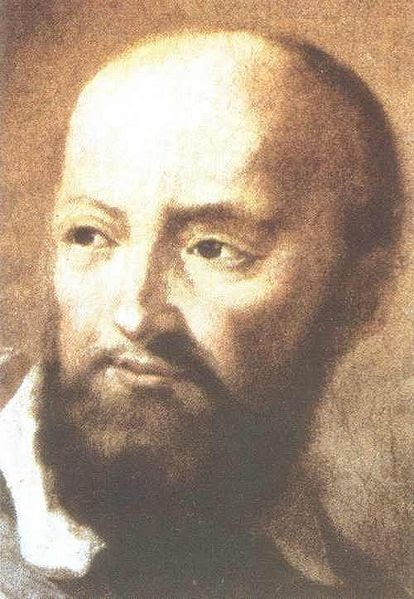The feast of St Francis de Sales is celebrated on 24 January. He was an outstanding bishop, theologian, a Doctor of the Church, that is, someone recognised as having brought us to a deeper understanding of the teaching that Christ gave to St Peter and the Apostles to be passed on to each generation. This great saint is a patron saint of journalists and writers - and of the Deaf and hearing impaired. Below is something I posted originally on 24 January 2009 and again four years later. This time I've added [some comments].
I originally posted the following on 24 January 2009.
Today is the feast of St Francis de Sales (1567-1622), Bishop and Doctor of the Church, patron of journalists and of the Deaf. So he is my patron on both counts, since I edit Misyon [phased out in 2018] and have been working with the Deaf on a part-time basis since 1992 and frequently celebrate Mass in Sign Language. Above all, he was a man who lived the fulness of the priesthood as a bishop faithfully. Maybe he would be a blogger if he were around today. [My Sign Language was never fluent.]
The following information, which I found here, is from the National Catholic Office for the Deaf, located in Washington, DC.
St Francis De Sales: Patron of the Deaf and Hearing-impaired
In 1605, an indigent young man named Martin, a deaf-mute from birth, came almost daily to a house in Roche, France, where Bishop de Sales was staying, to ask for alms. He was a strong young man fit for all kinds of work, and the Bishop's housekeeper often allowed him to help her in payment for the Bishop's generosity. One day a servant introduced Martin to the Bishop.
As a result of his handicap, Martin, who was about 25 years old, had never received any kind of education -- or instruction in the Catholic faith. (It was presumed by all of the educated people of that age, the 17th century, that a deaf-mute was a mentally handicapped person and that trying to educate or trying to communicate religious truths to such a person would be a waste of time.)
At the time of their meeting, St Francis de Sales was visibly disturbed and touched with pity for the unfortunate Martin. St Francis realized that the poor man would remain forever ignorant of God and the rich mysteries of the Faith and that his lack of instruction would forever keep him from receiving the Sacraments of Penance and the Eucharist.
After considering young Martin's deprived condition for a time, St Francis determined that he would undertake the instruction of the young man.
By using signs that he formed with his hands and fingers, St Francis personally began to teach Martin about the Catholic Faith. Martin, as was soon clear, was highly intelligent and a very good pupil. After a period of time, through his gentle patience and persistence and with the signs and gestures he had invented for the purpose, St Francis succeeded in instructing Martin about God and His love for all men. All went so well that eventually Martin was able to receive the Holy Eucharist for the first time in 1606. Two years later, Martin was confirmed.
St Francis eventually hired Martin as his gardener and brought him along with him when he returned to his episcopal household in Annecy, France.
Martin's devotion to the Bishop of Geneva was second only to his devotion to God. Martin prayed fervently, examining his conscience every evening before retiring, regularly confessed his sins to the Bishop, and assisted devoutly at the Bishop's Mass whenever he could.
Sixteen years later, no one would be more affected by the death of St Francis de Sales than his faithful servant Martin, who would visit his master's last resting place almost every day until the day he himself died.
The above account uses a term that is not used anymore: 'deaf-mute'. As a literal matter of fact, people who are deaf aren't mute, since they have voices and many can learn to speak.
Neither is the word 'handicap' used much now but rather 'disability'. I don't like the term 'differently-abled'. It cannot hide the reality that a person who is deaf or blind, for example, does have a disability that creates difficulties for that person in some situations. Deaf people prefer the word 'Deaf', with a capital 'D' to describe themselves as a group. Being profoundly deaf from birth is different from becoming hearing-impaired from old age, for example. [I now fit into that category and use hearing aids, as do many of my companions here where I now live in Ireland.]
Those of us who can see and hear tend to think that blindness is a greater disability than deafness. But deafness, whether from birth or coming with old age, is a disability that isolates in a way that blindness doesn't. Most deaf people here in the Philippines don't share a language even with their own family. And the only 'native signers' I know here are the hearing children of deaf parents.
St Francis saw how isolated Martin was and broke through that isolation.
+++
I added this on 24 January 2013. Here is the only deaf-blind priest, Fr Cyril Axelrod CSsR, speaking to seminarians and priests.
Fr Cyril Axelrod CSsR CBE
You can read Father Cyril's extraordinary story here. He was born profoundly deaf and began to go blind when he was already a priest due to Usher syndrome.
The needs of those who are profoundly deaf are widely recognised now in many countries. Here in Ireland, for example, Irish Sign Language became an official language of the State in 2017. However, I think that the Catholic Church needs to respond much more to the needs of the profoundly deaf as did St Francis de Sales to Martin.
Part of a Tutorial on Celebrating Mass in American Sign Language.
(Archdiocese of Washington)












